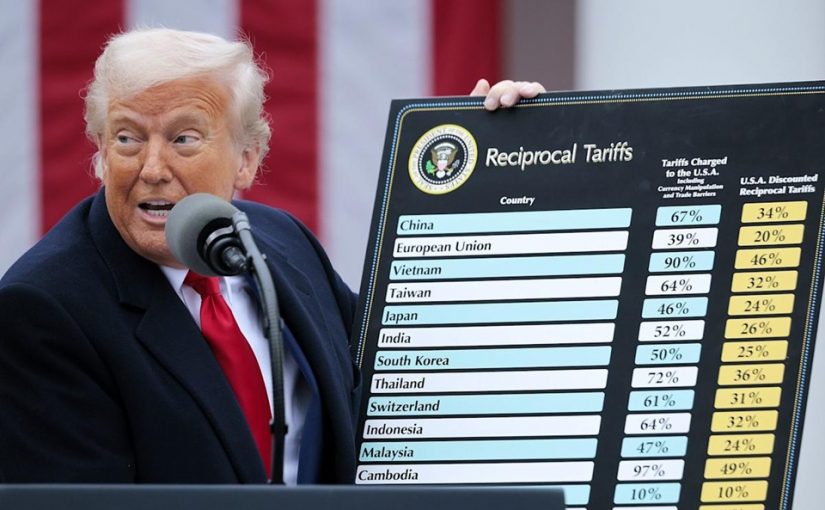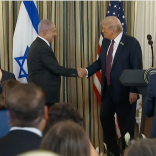Oscar-winning actress Diane Keaton dies at 79
World’s economic chiefs face Trump’s trade war in Washington

File photo: Bloomberg
World economic and finance chiefs want an off-ramp from the worst global trade crisis in a century. This week they’re heading toward its epicenter.
Washington makes a turbulent backdrop to the spring meetings of the International Monetary Fund and World Bank, headquartered in the US capital as anchors of America’s economic and financial clout. President Donald Trump’s tariff war hasn’t just roiled markets and raised recession fears: It’s also called into question US economic and security leadership — a pillar of the post-World War II global order — like never before.
The stage is set for “one of the most stark and dramatic meetings I can think of in recent history,” says Josh Lipsky, senior director of the GeoEconomics Center at the Atlantic Council and former IMF adviser. “You have at this moment a deep challenge to the multilateral rules-based system which the US helped build.”
Trade will be top of mind during the meetings, which start Monday, and many countries may use the opportunity to pursue talks with the US. Trump, who’s already dialed back some tariffs he imposed this month, has displayed a preference for one-to-one deals while his administration aims to rally countries against China.
But finance ministers and central bankers from outside the US will also have the chance to consult among themselves – and start figuring out how to maintain a global financial system without the US.
“All those traveling to Washington are interested in the survival of the existing world order,” says Karsten Junius, chief economist at Bank J Safra Sarasin in Zurich. “We have to find out how to do this without provoking Trump.”
Meanwhile, economic risks are mounting. Trump’s tariffs are set to shave $2 trillion off world gross domestic product by the end of 2027, according to Bloomberg Economics, which cut its global growth forecast for this year to 2.7% from 3.1%. It also downgraded the US to 1.3% from 2.1%.
China overtures
China is the closest US competitor, as well as Trump’s main target as he’s convinced it unfairly benefited from globalization and freer trade at America’s expense. Beijing only joined the IMF’s elite club of reserve currency-issuers less than a decade ago, and has an opportunity to further build its soft power and influence.
“China is now positioning itself as the leader of the rules-based global trade system, and painting the US as a dangerous rogue nation determined to blow up orderly trade relations,” says Stephen Olson, a former US trade negotiator now with the ISEAS-Yusof Ishak Institute in Singapore.
Trump aides say they want other countries to join its China trade crackdown. But as tariff threats ramped up, advanced economies that have been close US allies since WW II – and were largely on board with the Biden administration’s pressure on Beijing – have made overtures to China.
The European Union, which is sending top officials to Beijing in the coming months, has a two-pronged approach to the trade war: respond jointly and decisively, while keeping the door open for deals. The UK has sought to position itself as a potential broker between the US and the EU – and perhaps even China, where three ministers have visited this year.
Meanwhile, China’s leader Xi Jinping has sought to firm up relations in Southeast Asia, where many countries rely on exports to the US but are facing some of Trump’s steepest tariffs.
Major economies like the UK, Germany and Japan have already held discussions with Trump’s team since the trade war escalated. British officials, for instance, are headed to Washington seeking lower duties on cars and an exemption from higher anticipated levies on pharmaceuticals, which together make up one-quarter of exports to the US, in return for cutting tariffs on American food and taxes on tech giants.
For smaller countries, the opportunities afforded by the IMF-World Bank meetings are arguably even more valuable – because they likely don’t have other channels.
“There’s going to be a lot of door-knocking” during the Washington meetings, says Frederic Neumann, chief Asia economist at HSBC Holdings Plc in Hong Kong. Small countries, he says, often “don’t know exactly how to go about negotiating. What does the US want? Establishing that contact will be very important.”
Trump’s pivot toward unilateral action and bilateral deals will further undermine the utility of the Group of 20, whose finance ministers and central bank bosses will also gather this week, and raises questions about Washington’s commitment to global post-financial crisis banking reforms, which it’s yet to implement.
“We’re no longer in a world where we can sync policy responses,” says Clemence Landers, vice president and senior policy fellow at Center for Global Development.
Already hobbled by divisions over Russia’s invasion of Ukraine, the US has further distanced itself from the G-20, which represents about 85% of the global economy. “The cost of not having the G-20 is that you won’t have a level of economic policy coordination, and that should be terrifying people,” she says.
Bretton Woods
As for the IMF and World Bank themselves, they’re in the crosshairs – and they know it. Trump has ordered a review of US membership in multilateral bodies by August.
The two lenders have been highlighting ways they can be useful to America. The biggest recipient of IMF funds is Argentina, currently governed by close Trump ally Javier Milei. It was already by far the fund’s top debtor, and has a long history of failed loans — but just got greenlighted for another $20 billion anyway.
US Treasury Secretary Scott Bessent, whose office ultimately manages Washington’s relationship with the IMF, travelled to Buenos Aires last week after the latest IMF loan was announced, signalling at least part of the administration supports the fund’s work.
IMF and World Bank leaders have also pointed out to the administration that America — as their biggest shareholder – already has the power to shape policies or block decisions it opposes.
The risk of outright US withdrawal from the IMF is ultimately low, according to Jimena Zuniga of Bloomberg Economics. Still, she concludes in a recent analysis that the lender likely faces a loss of status – driven by geopolitical fractures, an inward turn by the US, and declining resources relative to other parts of the global financial safety net.
A weaker IMF and World Bank — known as the Bretton Woods institutions — would be an acute risk for emerging market economies struggling with high debt levels, dwindling reserves or other fiscal challenges which rely on the fund, such as Kenya, Egypt and even Ukraine.
“The fund is precisely the type of organization that allows Trump to pursue foreign policy objectives aligned with national or personal interest,” Zuniga wrote, “while getting others to help foot the bill.”
Meanwhile, there might be benefits to keeping a low profile.
One European central banker, who asked not to be identified giving candid comments about fears of the US, said the IMF has been noticeably holding back since Trump moved into the White House. For good reasons: “When the lawnmower is on the way, you better not stick your head out.”












Leave a Reply
Be the First to Comment!
You must be logged in to post a comment.
You must be logged in to post a comment.